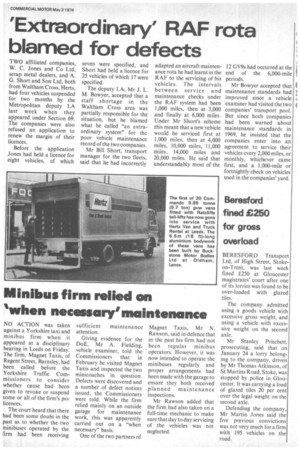'Extraordinary' RAF rota blamed for defects
Page 25

If you've noticed an error in this article please click here to report it so we can fix it.
TWO affiliated companies, W. C. Jones and Co Ltd, scrap metal dealers, and A. G. Short and Son Ltd, both from Waltham Cross, Herts, had four vehicles suspended for two months by the Metropolitan deputy LA last week when they appeared under Section 69. The companies were also refused an application to renew the margin of their licences.
Before the application Jones had held a licence for eight vehicles, of which seven were specified, and Short had held a licence for 25 vehicles of which 17 were specified.
The deputy LA, Mr J. L. M. Bowyer, accepted that a staff shortage in the Waltham Cross area was partially responsible for the situation, but he blamed what he called "an extraordinary system" for the poor vehicle maintenance record of the two companies.
Mr Bill Short, transport manager for the two fleets, said that he had incorrectly adapted an aircraft maintenance rota he had learnt in the RAF to the servicing of his vehicles. The intervals between service and maintenance checks under the RAF system had been 1,000 miles, then at 3,000 and finally at 6,000 miles. Under Mr Short's scheme this meant that a new vehicle would be serviced first at 1,000 miles, then at 4,000 miles, 10,000 miles, 11,000 miles, 14,000 miles and 20,000 miles. He said that understandably most of the 12 GV9s had occurred at the end of the 6,000-mile periods.
Mr Bowyer accepted that maintenance standards had improved since a vehicle examiner had visited the two companies' transport pool. But since both companies had been warned about maintenance standards in 1969, he insisted that the companies enter into an agreement to service their vehicles every 2,000 miles, or monthly, whichever came first, and a 1,000-mile or fortnightly check on vehicles used in the companies' yard.




























































































